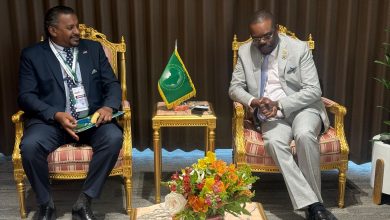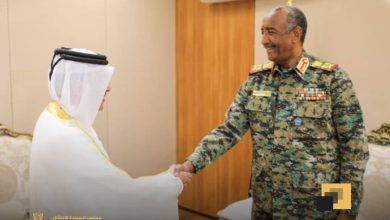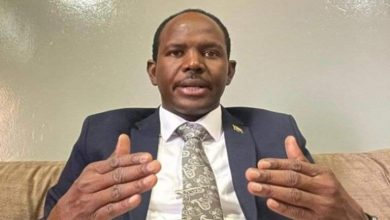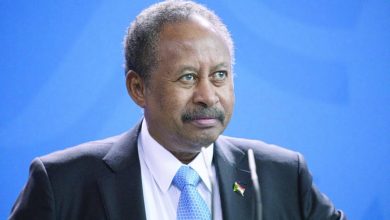Head of the Sudan (SLM/A) “Transitional Council”, Commander Muhi al-Din Sharaf, in an interview to (Sudan Events ): The SAF and the armed struggle movements are united to defeat the militia
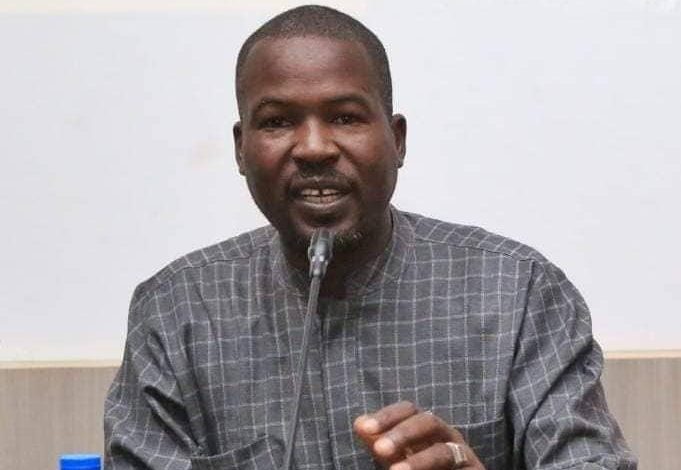
The militia kidnapped a man from the civil administration in Darfur and demanded huge sums of money from him in cases that were settled 40 years ago
The negotiations are meaningless and the militia must end
Al-Fasher will be a graveyard and the end of the thugs
We hold the militia responsible for the famine in Zamzam camp
The Attitude of neutrality is not the position of the honorable
For these reasons (…) we demand our participation in the negotiations
A number of armed movements that signed Juba Agreement for Peace in Sudan have determined their position since the rebellion of the Rapid Support RSF Militia against the Sudanese Armed Forces SAF in April of last year, and they are participating alongside the army and achieving victories with it that history will record for them.
Among these movements is the Sudan Liberation Movement and Army (SLM/A) (Transitional Council) led by Commander Muhi al-Din Sharaf, and Sharaf renewed in an interview with (Sudan Events ) Their standing with the armed forces SAF to defeat the militia, and called on other neutral movements to join the battle for dignity and the Sudanese citizen, so to the minutes of the Interview .
Sudan Events- Interview – Aya Ibrahim
First, what is your comment on the recent speech of Lt. Gen. Yassir Al-Atta and what most caught your attention in it?
The Assistant Commander-in-Chief of the Sudanese Armed Forces SAF ,Lt. Gen. Yassir Al-Atta, spoke about the SAF commandment and the members of the Sovereignty Council TSC and that they are cohesive, united and have one vision in the context of resolving the battle.
In our estimation as a movement, all plans and ideas are directed towards the army and the armed struggle movements being of one heart in managing the battle and defeating the rebel militia, which is one of the main objectives of the battle.
On the political side, it is necessary to hold accountable those who stand behind Daglo family ilitia from the political powers at home and abroad, which is a speech addressed by Lt. Gen. Yassir Al-Atta, who addressed the aspects that the Sudanese people agree on with the SAF Commandment in resolving the battle against Daglo family militia.
The new American invitation and Geneva talks scheduled for the fourteenth of this month, how do you view the course of its steps?
We have a clear position on the negotiation process that the Jeddah platform is the only platform agreed upon to be the entity that hosts the negotiations between the government and the militia. We as a movement have stressed that we must adhere to the outcomes of Jeddah and that the militia must leave the city’s notables, homes, lands, farms of the people of Darfur and state institutions.
The militia responded to the call, and on the other hand, on the ground, it is practicing its inhumane violations. In what framework do you put that?
First, we condemn the recent actions and violations that occurred by the militia regarding threatening the leaders of the Fur tribe and kidnapping a man from the local administration in Kabkabiya and demanding a ransom and huge sums of money in cases that were settled forty years ago.
Such violations confirm that the militia has no goal or programs and is a terrorist militia that practices abuse, killing, looting and threats. Therefore, negotiations are meaningless and the militia must end.
The battle of El Fasher is still ongoing. What are the expected scenarios regarding it?
The position of the armed forces and the joint forces is strong in the city of El Fasher, as the forces were able to defeat and break the hard power of the militia and kill most of its leaders in the battle of El Fasher.
The city of El Fasher has become an impregnable dam against the thugs and it is difficult for them to find a foothold or an opportunity to enter it. The credit for this goes to the army, the joint forces, the mobilized and the people who have stood firm, especially the Darfuri women who carried weapons for the sake of dignity and humanity and to reject abuse.
The city of El Fasher will be a graveyard and the end of the thugs.
Famine was officially declared in Zamzam camp. How do you comment and who bears responsibility for that?
The main reason for the famine in Zamzam camp is the siege imposed by the militia on the city and the refusal to allow aid and humanitarian assistance into it.
We hold Daglo militia responsible for this. No matter what the war is, there are rules of conduct in the event of war that any party must abide by, but the militia has no principles, morals or humanitarian dose by the continuous bombing of camps for the displaced and notables and targeting health institutions.
The militia has nothing to do with humanity. It must be held accountable and international institutions must take a decision to impose a militia siege on El Fasher, which has reached a stage where there is famine in Zamzam camp.
Let’s talk about the Sudan Liberation Movement and Army (SLM/A) the Transitional Council, and its role in the Battle of Dignity?
Personally, I was a member of Juba Peace Negotiations 2020 during the start of negotiations between the Sudanese government and the Revolutionary Front.
I was responsible for the land and hawakeer file. Juba Agreement addressed major issues in the context of addressing the Sudanese crisis.
We reached Juba Agreement for Peace in Sudan. This agreement is good and must be preserved. We were part of it. Since the movement entered Khartoum according to Juba Agreement, it was present until the dispute in the management of the organization between us and the former president reached me.
I was assigned by the comrades in the leadership body to head the movement during the war. We decided to set out and participate in the battle, and the movement has been participating since the beginning of the April war.
What about the other movements, how do you view their contributions to the battle of dignity and the movements that still adhere to the position of neutrality?
We as a transitional council, after rejecting the leadership of the former president and declaring our position from the beginning of the war, directed our forces to engage in garrisons and divisions in response to the call of the Sudanese Armed Forces.
There are other movements that responded to the call, but other movements are still in a position of neutrality. These do not have a clear vision.
This is a war of occupation. We demand that they come to their senses and join the ranks of dignity and the national ranks.
This attitude is not the position of honorable people or people who have a project. We call on the comrades who are still in a position of neutrality to leave it and join the ranks of the nationalists and the Sudanese people.
Some movements have demanded to be involved in the peace talks, including Commander Minawi.
Do you see the necessity of that?
Important as movements that signed Juba Agreement and we are partners in the battle, if there is any platform that addresses Sudanese issues, there is no objection to the movements participating as a force that has a right in the homeland, participation is necessary even if it is just observers because Juba Peace Agreement is big and the militias can demand its cancellation, so in order to preserve Juba peace, we must participate in any negotiations so that the agreement does not collapse.
The fourteenth of this month marks the seventieth anniversary of Army Day. What do you say on this occasion?
This is a big occasion for all the Sudanese people, we must contribute to it and we as armed struggle movements, the holiday is important for us. We talked in Juba Agreement about the axis of security reform and security institutions, that there be a single national army, reform is at the level of the doctrine of the armed forces and vertical and horizontal institutions, and objective and organic participation of all the sons of the Sudanese people in the institution and not establishing militias in exchange for the army, and that there be a single army and a single institution entrusted with protecting the sovereignty of Sudan and not accepting any other force outside the institution.
Eid has many connotations and the country is going through crises. We must demand real reforms and the institution must be made up of officers, non-commissioned officers and soldiers who represent all Sudanese components.
The picture must be formed in the high and middle command and in the soldiers, divisions and various military divisions of battalions, brigades and various units.
Reform so that the army is strong, solid and qualified, with the ability to protect Sudan and its sovereignty and stand against all conspiracies.
In your opinion, where will the Sudanese crisis go? A military resolution or negotiations?
I am a researcher in the field of conflict resolution and humanitarian studies. In my opinion, any conflict in the region, internal or external, or between countries, and specifically the conflict in Sudan, will end with negotiations. Even if a military solution is reached, there will be negotiations to address some issues. The militias will reach the conviction that the war against the Sudanese army SAF and people has no meaning. They will lay down their weapons. Whenever this is done, negotiations will be held with the rest of their leaders and members to address their situation and hold accountable those who committed crimes against the Sudanese people.
These procedures require negotiations. The issue of justice and transitional justice.
All hypotheses can be put forward. The militias no longer have a large number. The solid and large force has been defeated. The crisis will end with dialogue and negotiation, but the militias must be broken and they must admit their mistakes and respect the venerable Sudanese institution.
This crisis is not between the militia and the army. The crimes of these thugs have affected the common citizen. The political forces have roles in managing a Sudanese-Sudanese dialogue within Sudan and under the supervision of an executive or constituent government to reach important answers and make the war the last of Sudan’s wars.
In the Sudanese dialogue, there are basic issues raised, which are the constitution, identity, citizenship, the single army, and other major issues.
